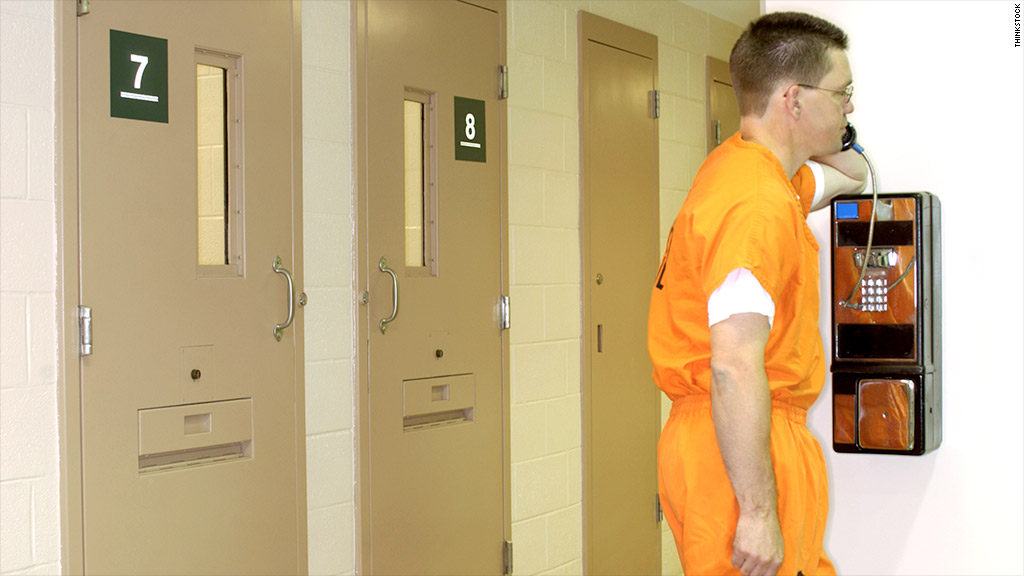Ever heard of fake prison calls? This chilling scam is becoming more common, and it could happen to anyone, even you. Imagine getting a call from someone claiming to be a law enforcement officer or a prison official, saying your loved one is in trouble and needs immediate financial help. Sounds terrifying, right? But here’s the kicker—it’s all a scam designed to exploit your emotions and empty your wallet.
Fake prison calls are part of a growing trend of scams that prey on unsuspecting victims. These scammers are sneaky, using psychological tactics to manipulate people into sending money. And guess what? It’s working. Thousands of people fall victim to this scam every year, losing not just their hard-earned cash but also their peace of mind.
In this article, we’ll dive deep into the world of fake prison calls, exploring how they work, why they’re so effective, and—most importantly—how you can protect yourself and your loved ones. So buckle up, because this is one ride you don’t want to miss!
Read also:Ms Pacman Video Guatemala A Cultural Phenomenon Thats Got Everyone Talking
Table of Contents
- What Is a Fake Prison Call?
- How Does It Work?
- Why Are People Targeted?
- Red Flags to Watch Out For
- Real-Life Stories
- Statistics on Fake Prison Calls
- How to Protect Yourself
- Legal Actions Against Scammers
- Emotional Impact on Victims
- Final Thoughts
What Is a Fake Prison Call?
Let’s break it down, shall we? A fake prison call is a type of scam where a fraudster pretends to be a prison official, police officer, or some other authority figure. They’ll contact you, usually over the phone, claiming that a family member or friend is in jail and needs bail money or legal fees. The catch? None of it’s true. These scammers rely on fear and urgency to get you to act without thinking.
But here’s the thing: these calls aren’t random. Scammers often do their homework, gathering personal information about you and your loved ones from social media or public records. This makes their story sound believable, which is why so many people fall for it.
Who Can Be a Target?
Anyone can be a target, but scammers tend to go after vulnerable groups, like the elderly, parents with kids away at college, or people who are already under stress. It’s not fair, but that’s how these crooks operate—they prey on the weak.
How Does It Work?
Alright, let’s talk about the mechanics of a fake prison call. First, the scammer will call you, often using a spoofed number to make it look like the call is coming from a legitimate source. Then, they’ll spin a tale about how your loved one is in trouble and needs money fast. They might even use dramatic language, like “If you don’t pay now, they’ll lose their freedom forever!”
Once they’ve got you hooked, they’ll demand payment, usually through untraceable methods like gift cards or wire transfers. And here’s the kicker—they’ll often ask you to keep it a secret, claiming it’s for the victim’s safety. But really, they just don’t want you to verify the story.
Common Tactics Used by Scammers
- Impersonating law enforcement or prison officials
- Using urgent and threatening language
- Requesting payment via untraceable methods
- Asking victims to keep the call a secret
Why Are People Targeted?
Scammers target people for one reason and one reason only: money. But it’s not just about the cash; it’s about exploiting human emotions like fear, love, and guilt. They know that when someone you care about is in trouble, your first instinct is to help, no matter what. And that’s exactly what they bank on.
Read also:Do Goats Have Top Teeth Unveiling The Mystery Behind Goat Dental Anatomy
Additionally, scammers love targeting people who are less tech-savvy or who may not be familiar with common scams. This includes the elderly, immigrants, or anyone who might not have access to the latest information on fraud prevention.
Red Flags to Watch Out For
Now that you know how fake prison calls work, it’s time to learn how to spot them. Here are some red flags to watch out for:
- The caller refuses to give you contact information or a way to verify their identity.
- They demand immediate payment without giving you time to think or consult with others.
- They ask for payment via gift cards, wire transfers, or other untraceable methods.
- They insist you keep the call a secret.
- The story seems too dramatic or far-fetched.
Remember, if something feels off, it probably is. Trust your gut and don’t be afraid to ask questions or seek help from someone you trust.
Real-Life Stories
To give you a better understanding of how these scams play out, let’s look at a couple of real-life stories:
Story 1: Jane, a retired schoolteacher, received a call one evening saying her grandson was in jail after getting into a fight. The caller claimed to be a police officer and demanded $5,000 for bail. Jane was frantic and quickly sent the money. It wasn’t until later that night, when she called her grandson directly, that she realized it was all a scam.
Story 2: Mark, a college student, got a call from someone claiming to be a prison official. They said his brother had been arrested for drug possession and needed $10,000 to avoid charges. Mark was hesitant but eventually sent the money. It wasn’t until his brother called him later that he realized he’d been scammed.
Statistics on Fake Prison Calls
The numbers don’t lie. According to the Federal Trade Commission (FTC), fake prison calls are one of the fastest-growing types of scams in the U.S. In 2022 alone, over 10,000 people reported losing money to this type of scam, with losses totaling more than $20 million. And those are just the reported cases—many victims never come forward due to embarrassment or fear of retaliation.
But it’s not just the U.S. that’s affected. Countries around the world are seeing an increase in these scams, with victims losing everything from small amounts to their life savings.
Why Are These Scams So Effective?
There are a few reasons why fake prison calls are so successful. First, scammers often use social engineering techniques to make their stories sound believable. Second, they target vulnerable groups who may not know how to spot a scam. And finally, they rely on the element of surprise—most people aren’t expecting to get a call like this, so they’re more likely to react without thinking.
How to Protect Yourself
So, how can you protect yourself from fake prison calls? Here are a few tips:
- Verify the caller’s identity by contacting the relevant authorities directly.
- Never send money or gift cards to someone you don’t know.
- Be wary of calls that demand immediate action or payment.
- Don’t give out personal information over the phone.
- Stay informed about the latest scams and share this information with friends and family.
And remember, if you’re ever unsure, it’s always better to err on the side of caution. It’s better to be safe than sorry.
Legal Actions Against Scammers
Thankfully, law enforcement agencies are taking fake prison calls seriously. In recent years, there have been several high-profile arrests and prosecutions of scammers involved in these schemes. Governments and organizations are also working to educate the public and make it harder for scammers to operate.
But there’s still a long way to go. Scammers are constantly evolving their tactics, and staying one step ahead is a challenge. That’s why it’s so important for individuals to be vigilant and report any suspicious activity to the authorities.
Emotional Impact on Victims
While the financial losses from fake prison calls can be devastating, the emotional impact is often just as bad. Victims often feel ashamed, embarrassed, or even guilty for falling for the scam. Some may even blame themselves, thinking they should have known better.
But here’s the thing: these scammers are professionals. They know exactly what buttons to push to get you to act. So if you’ve been scammed, don’t beat yourself up. Instead, focus on moving forward and helping others avoid the same fate.
Final Thoughts
Fake prison calls are a scary reality, but they don’t have to be. By staying informed, vigilant, and skeptical, you can protect yourself and your loved ones from falling victim to these scams. Remember, if it sounds too good—or too bad—to be true, it probably is.
So, what can you do next? Share this article with friends and family, report any suspicious calls to the authorities, and keep yourself updated on the latest scams. Together, we can make the world a safer place, one call at a time.
And hey, if you’ve got any questions or stories to share, drop them in the comments below. We’d love to hear from you!


